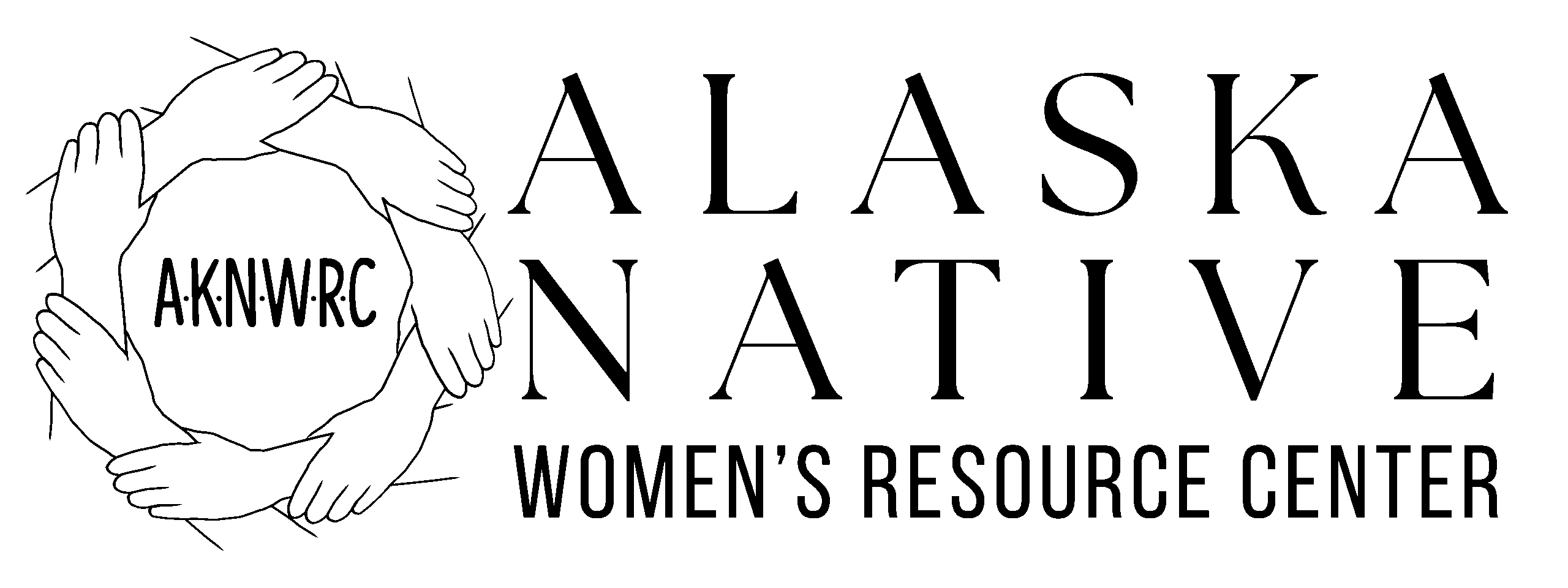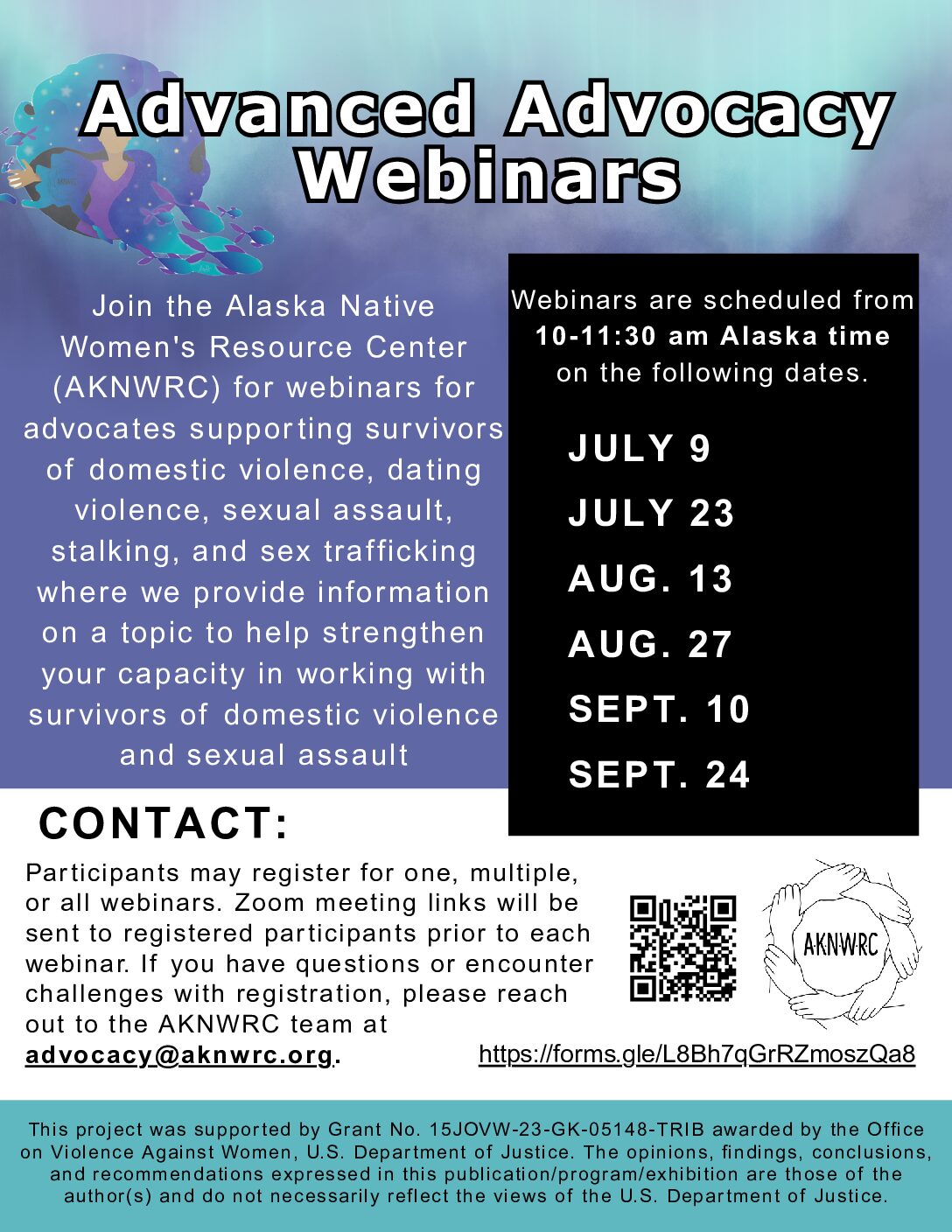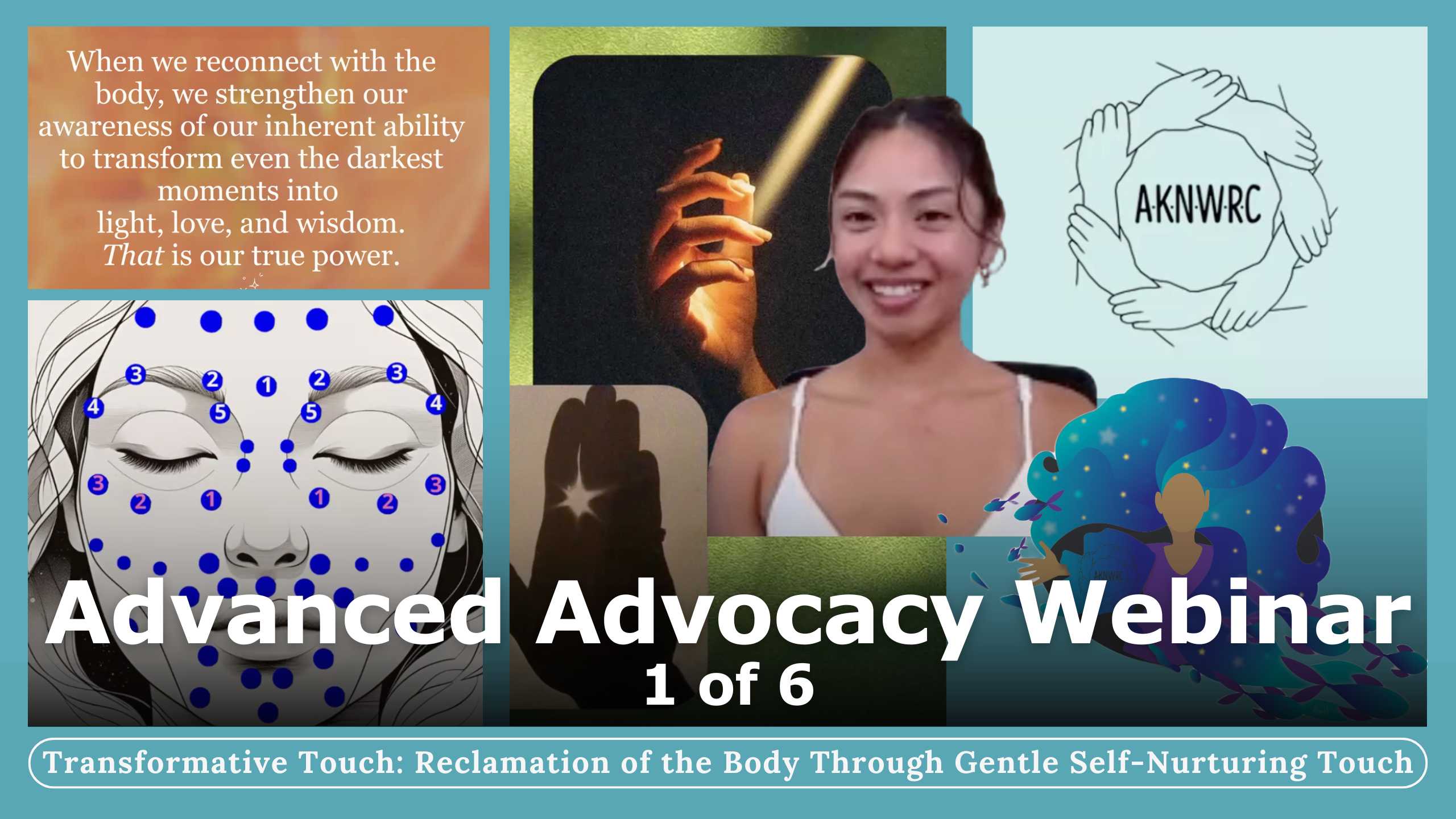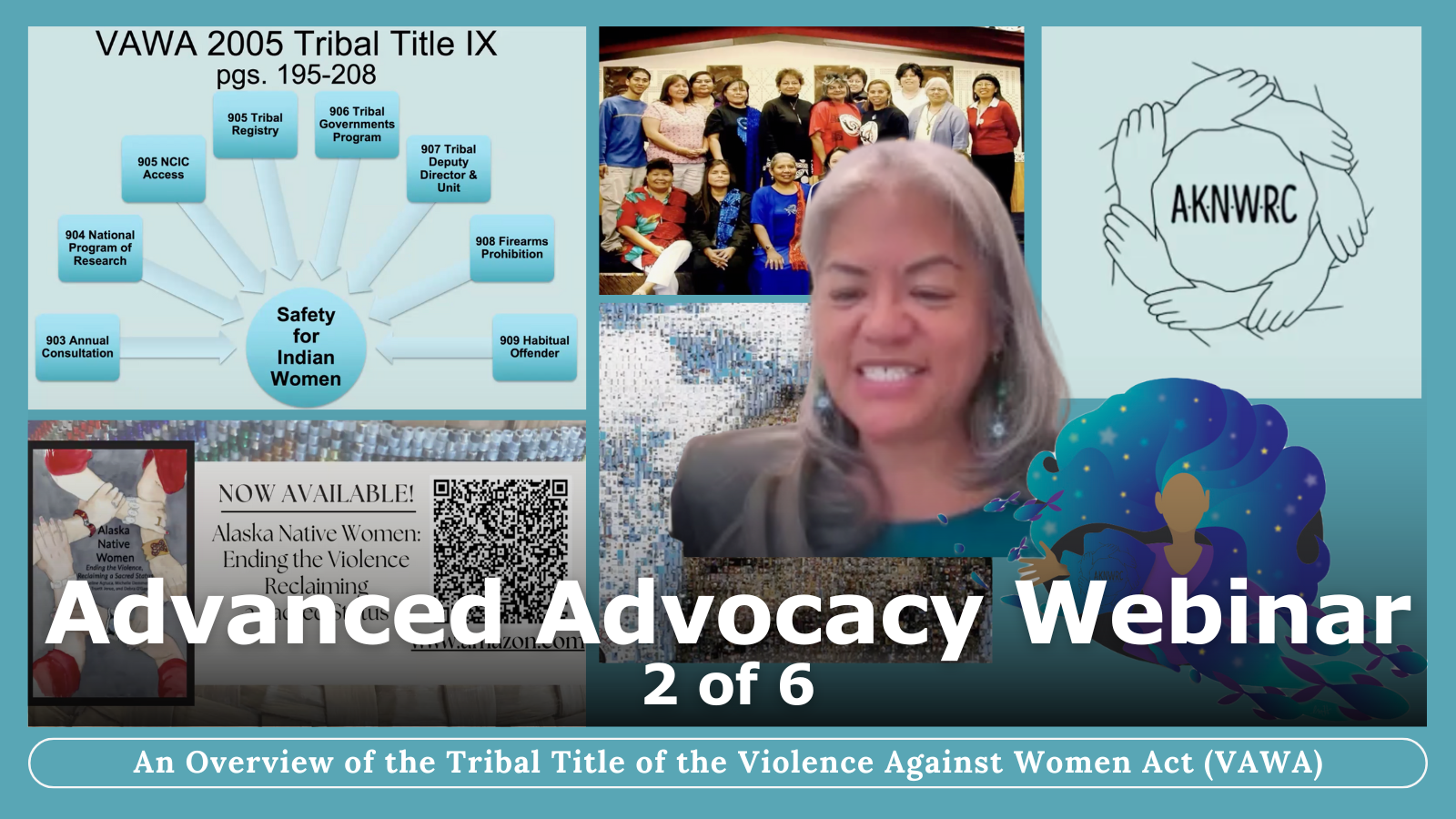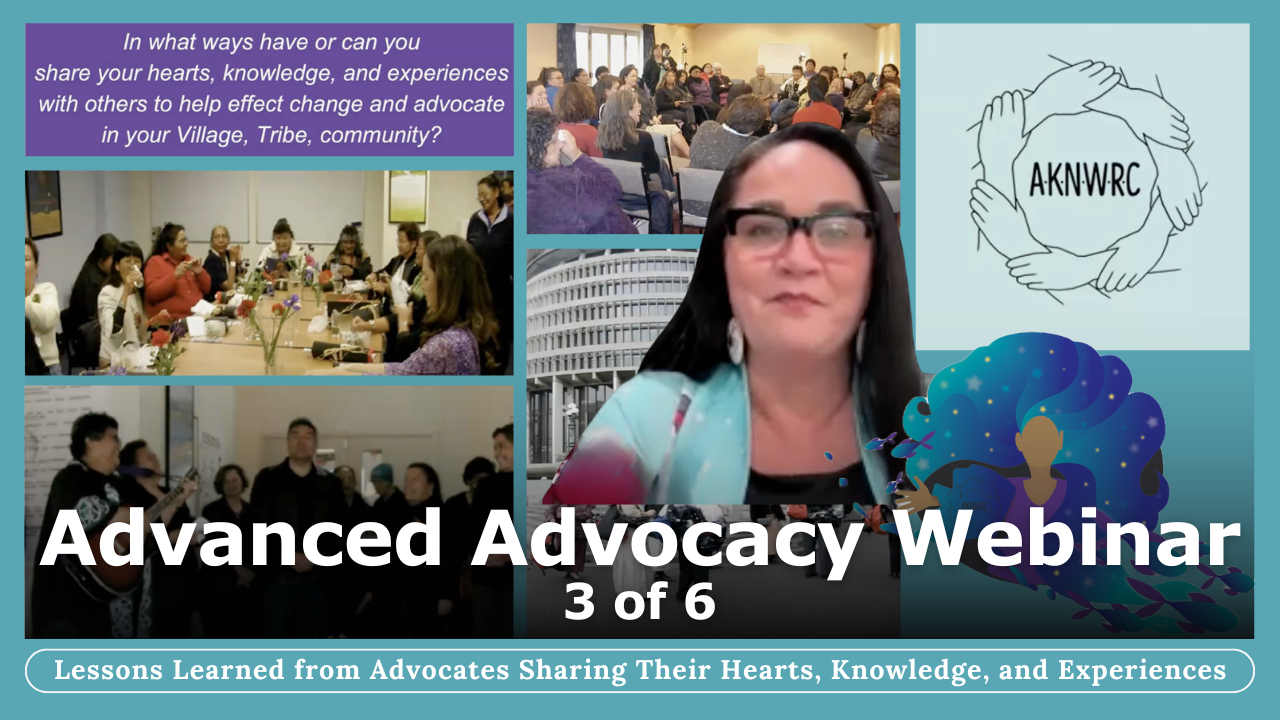|
Safety, Justice, and Healing Rooted in Alaska Native Voices, Languages and Teachings 2025 Webinars Webinar 1: July 9, 2025, 10–11:30 a.m. Alaska Standard Time (AST) Title: Transformative Touch: Reclamation of the Body Through Gentle Self-Nurturing Touch In this trauma-informed webinar designed for advocates working with survivors of domestic violence, dating violence, and sexual assault, we’ll explore the power of gentle, self-nurturing touch as a grounding practice to support nervous system regulation, reconnection, and internal safety. Through a holistic lens informed by skin wellness and somatic awareness (awareness of the body), this session will introduce simple, accessible techniques—such as facial touch, breath-paired skincare rituals, and safe pressure points—that can be shared with survivors as inherent tools for self-soothing, healing from abuse and trauma, and empowerment. Advocates will leave with practical, consent-based approaches to support healing that begin from within the body, one calming, transformative touch at a time. Bio: Keani Julian became a licensed esthetician in 2021 after discovering her passion for skin health and wellness. At the same time, she began her healing journey through therapy. While she originally planned to focus on the clinical side of skincare and product formulation, her work with clients—and the work she has done (and is joyfully continuing to do) on herself through individual and group therapeutic experiences—led her to a more holistic understanding of healing. Supporting others in reconnecting with themselves through daily self-nurturing and nervous system regulation has shown her how transformative care can be when it starts from within. Keani believes we’re often sold the idea that we need to look or be a certain way to be worthy, but the truth is, we are enough simply because we exist. Skin is often a mirror of what’s happening internally—in our minds, hearts, and bodies—and she is passionate about helping people create space for healing that feels safe, empowering, transformative, and grounded. |
|
Webinar 2: July 23, 2025, 10–11:30 a.m. Alaska Standard Time (AST) Title: An Overview of the Tribal Title of the Violence Against Women Act (VAWA) This webinar will review the Tribal Title of VAWA, including the amendments over each reauthorization from 2000 to 2022, and the critical role that advocates continue to have in increasing women’s safety. Over the past five decades, the organizing efforts of survivors, advocates, Tribal leaders, and allies have increased understanding of systemic barriers facing Native women and American Indian and Alaska Native Tribes and inspired social change. Advocates are the life force and foundation of the grassroots movement to restore Tribal sovereignty and increase women’s safety. Resource: Alaska Native Women Ending the Violence, Reclaiming a Sacred Status, 2023. Bio Paula Julian is a Senior Advisor with the Alaska Native Women’s Resource Center. She works with staff and partners to identify, analyze, and draft policy priorities, provide training and technical assistance, engage in advocacy efforts to advance priorities, and develop partnerships to strengthen laws, policies, and responses addressing violence against Native women. Previously, she served as Senior Policy Specialist for the National Indigenous Women’s Resource Center (NIWRC) and Editor of NIWRC’s Restoration Magazine, developing NIWRC’s policy agenda on restoring sovereignty to increase Native women’s safety. Paula was also a Program Manager at the Office on Violence Against Women, U.S. Department of Justice. Highlights of her time at OVW include the analysis and development of policies affirming government-to-government relations and the Federal trust responsibility for the Department and with other Federal agencies; development of the Safety for Indian Women from Sexual Assault Offenders Initiative; development and administration from 2001–2006 of the Tribal Domestic Violence and Sexual Assault Coalitions Grant Program; development and implementation of technical assistance and training; and management of various OVW Programs. |
|
Webinar 3: Aug. 13, 2025, 10–11:30 a.m. Alaska Standard Time (AST) Title: Lessons Learned from Advocates Sharing Their Hearts, Knowledge, and Experiences Description: “In 2003, a delegation of tribal domestic violence and sexual assault coalitions funded under the Office on Violence Against Women met with the Maori advocates in Aotearoa, the Maori name for New Zealand. This international exchange provided a new view of the struggle to increase the safety of Indigenous women from domestic [and sexual] violence. It marked the beginning of an increased understanding of the shared experience of Indigenous women and colonization…Lessons learned from the exchange provided part of the inspiration and logic for the separate tribal title, Safety for Indian Women of VAWA 2005.” (Alaska Native Women Ending the Violence, Reclaiming a Sacred Status, p. 59) This webinar will highlight how and what changes can be achieved when advocates come together to share their hearts, knowledge, and experiences. Resource: Alaska Native Women Ending the Violence, Reclaiming a Sacred Status, 2023. Bio: Nicole Matthews is a descendant of the White Earth Band of Ojibwe and is the CEO of the Minnesota Indian Women’s Sexual Assault Coalition, a statewide Tribal Coalition and National Tribal Technical Assistance Provider, addressing sexual violence and sex trafficking against Native people. The mission of this organization is to strengthen the voices of Indigenous women to create awareness, influence social change, and reclaim the traditional values that honor the sovereignty of Indigenous women and children, thereby eliminating the sexual violence perpetrated against them. Their vision is: Creating Safety and Justice for Native Women Through the Teachings of Our Grandmothers. Nicole was one of five researchers who interviewed 105 Native women who were used in prostitution and trafficking for their report: Garden of Truth: The Prostitution and Trafficking of Native Women in Minnesota. Nicole serves as the Chair for the Missing and Murdered Indigenous Women’s Reward Fund Board; she served as the Vice Chair of Minnesota’s Missing & Murdered Indigenous Women’s Task Force; she serves on the Tri-Lateral Group on Violence Against Indigenous Women; and she served on the State of Minnesota Attorney General’s Work Group on Sexual Assault. She is a TEDx Speaker, and a National and International Speaker on sexual violence and sex trafficking, and the intersections of racism and oppression. Nicole’s most important role is being a mother, grandmother, sister, auntie, and matriarch. |
|
Webinar 4: Aug. 27, 2025, 10–11:30 a.m. Alaska Standard Time (AST) Title: Plant Teachings to Support Grounding Exercises for Advocates and Survivors Description: “Many Native Elders remind us that plants are teachers. When we awaken our senses and observe nature, plants can lead us in finding ways to be healthy and resilient” (Plant Teachings for Growing Social-Emotional Skills, Alaska Edition (2023). Healing from the victimization of domestic violence and sexual assault with plant medicines, including through subsistence picking, community gardening, farming initiatives, or what some call therapeutic horticulture, can be tools that advocates can explore further and offer survivors. This webinar will share how advocates can work with survivors to create a salve (balm or ointment). After registering for this webinar, participants will receive an email with a list of supplies they can purchase. Resource: Plant Teachings for Growing Social-Emotional Skills, Alaska Edition (2023). How can therapeutic horticulture help meet the complex needs of domestic violence survivors and their children? VAWnet, 2018. Kōkua Kalihi Valley Bio: Tia Holley is an Inupiat descendant from King Island whose Inupiat name is Aisena, after her great-grandmother. She works for the Kenaitze Indian Tribe as a Traditional Wellness Consultant. She collaborates with the Wellness team, interagency departments, and local, state, and national programs to deliver culturally considerate coordinated Health Promotion events and activities, coordinates with other departments and local, state, and national agencies to disseminate best practices to support the holistic health of Un’ina (the people who come to us). She was an independent trainer/training team member for the Alaska Native Tribal Health Consortium in the Domestic Violence Initiative project, providing training to rural providers in Alaska. She was a Community of Practice Partner with the National Center on Domestic Violence, Trauma & Mental Health. She interned with the late Patti Bland, Alaska Network on Domestic Violence and Sexual Assault. She was a SART advocate volunteer for sexual assault victims and a local Domestic Violence Task Force member. She has worked as a victim’s, child, and sexual assault advocate and as a chemical dependency counselor. She has over 20 years of experience creating and presenting on child sexual abuse, domestic violence, addictions, and co-occurring disorders. She received her Bachelor of Social Work degree in 2012 cum laude, as a Chancellor’s Honors Student with a Phi Alpha Honor Society award in Social Work, Behavioral Health Practitioner Certification in 2019, and is a founding Board member of the Alaska Native Women’s Resource Center. |
|
Webinar 5: Sept. 10, 2025, 10–11:30 a.m. Alaska Standard Time (AST) Title: An Overview of the Alaska Pilot Project in the Tribal Subtitle B of the Violence Against Women Act of 2022 Description: This webinar will review the Alaska Tribal Subtitle, which “is intended to increase safety for Alaska Native women by addressing jurisdictional barriers preventing Alaska Native women from full access to justice resources and safety…Congress, through this Subtitle, reaffirms the inherent authority of Alaska Indian tribes to address civil and criminal matters, including protection orders, involving all Indian persons in the village. Second, it created a pilot program for Alaska Native tribes to implement STCJ [Special Tribal Criminal Jurisdiction] to exercise jurisdiction over non-Indians who commit the covered crimes within the specific area of the participating tribe.” Resource: Alaska Native Women Ending the Violence, Reclaiming a Sacred Status, 2023. Bio: Rick Haskins-Garcia is the Director of Law and Policy for the Alaska Native Women’s Resource Center. Rick was born in West Germany and raised in Florida. Rick moved to Alaska in 2018 and has dedicated himself to serving Alaska Tribes by providing training and technical assistance to Alaska Tribal courts and justice systems. Before joining AKNWRC, Rick served as a Tribal Justice Facilitator with the Alaska Native Justice Center (ANJC) and as the Tribal Justice Director and Associate General Counsel for the Association of Village Council Presidents (AVCP) in Bethel, Alaska. Rick also had the honor of serving as the District Court Magistrate Judge for the Alaska Court System’s 4th Judicial District, based in Aniak and Hooper Bay. Since 2018, Rick has lived and worked off the road in communities such as Bethel and Aniak. Through his work with AVCP, Rick has travelled extensively to many Yukon-Kuskokwim Delta Villages, connecting and assisting with Tribal court and justice capacity building, training, and technical assistance. Rick has been a licensed Attorney for over a decade and is licensed in the state courts of Florida and Alaska and the United States District Court for the Southern District of Florida. Denise Nerby was born and raised in Bethel, Alaska, and is a Tribal member of the Orutsararmiut Tribal Council. She is the daughter of Barbara and Carl Anvil Sr., a sister to four older brothers, and an Auntie to many. She is most proudly the mother of three children, Aiden, Carter, and Kira, and the wife of her husband, Jon Nerby. Denise currently serves as the Law & Policy Specialist at the Alaska Native Women’s Resource Center, where she assists Tribal governments and justice systems in identifying and incorporating traditional practices into modern services. Before this, Denise served in multiple capacities at the Association of Village Council Presidents in the Tribal Justice Department, assisting Tribal courts and Tribal governments in identifying efficacy and establishing or re-establishing their Tribal judicial systems. Before her work with Tribal justice, she worked as the Administrative Assistant for the Village Public Safety Officer Program, where her passion began in helping and assisting anyone in need. Denise loves to spend time at home with her family outside of work, caring for her growing children and beading. |
|
Webinar 6: Sept. 24, 2025, 10–11:30 a.m. Alaska Standard Time (AST) Title: Deep Dive: Role Playing on Safety Planning with Survivors Description: Survivor safety needs vary greatly, change over time, and from situation to situation. To support survivors in their efforts to achieve safety, advocates must engage in a safety planning process that is continuous, proactive, and prioritizes ongoing improvement and risk mitigation for achieving a static state of safety. Safety includes physical, emotional, economic, and social safety. This webinar will examine the differing safety concerns and needs of domestic violence, dating violence, and sexual assault victims, explore an expanded definition of safety, and provide practice in engaging survivors in safety planning conversations at various points in their healing journeys. Bios: Tami Truett Jerue is from the Village of Anvik and the Executive Director of the Alaska Native Women’s Resource Center (AKNWRC). Tami brings 40 years of direct services experience to this journey, beginning with the formation of AKNWRC in 2016. Tami joined a group of Alaska Native women who were passionate about ending interpersonal violence across Alaska. Tami and the Board of Directors believe interpersonal violence is a result of colonization and has no place in Native culture. Ms. Jerue has testified before Congress and the United Nations, bringing attention to the disproportionate rates of violence experienced by Alaska Native women and the lack of resources faced by Tribes. She was a commissioner on the Not Invisible Act (NIA) commission. Under Tami’s management, the AKNWRC has become a voice for Alaska Native issues, particularly affecting women, children, and families, telling truths to promote understanding, building partnerships, and, most importantly, supporting Alaska Native Tribes as they tackle the complex issues of interpersonal violence. Ms. Jerue has a Bachelor’s degree in Social Work and a master’s in Community Psychology. She worked for over 28 years for the Anvik Tribal Council in Tribal Administration, Indian Child Protection, Domestic Violence/Sexual Assault (DV/SA), and Counseling/Advocacy. She is married to Carl Jerue, Jr. of Anvik, sharing four beautiful children and six grandchildren. Martha Bravo is an Executive Coordinator for the Alaska Native Women’s Resource Center. She is the daughter of Bergman and Shirley (Wheeler) Moses of Allakaket and Nome, AK. She was raised between Allakaket, Lime Village, and Fairbanks. Martha previously worked as an advocate at Our Grandmother’s House Shelter in Fairbanks, as a Trauma Navigator at Tanana Chiefs Conference, and she also has experience in healthcare and government contract compliance. Martha is married with two children. She enjoys reading, traveling, and subsistence hunting and fishing with her family. |

